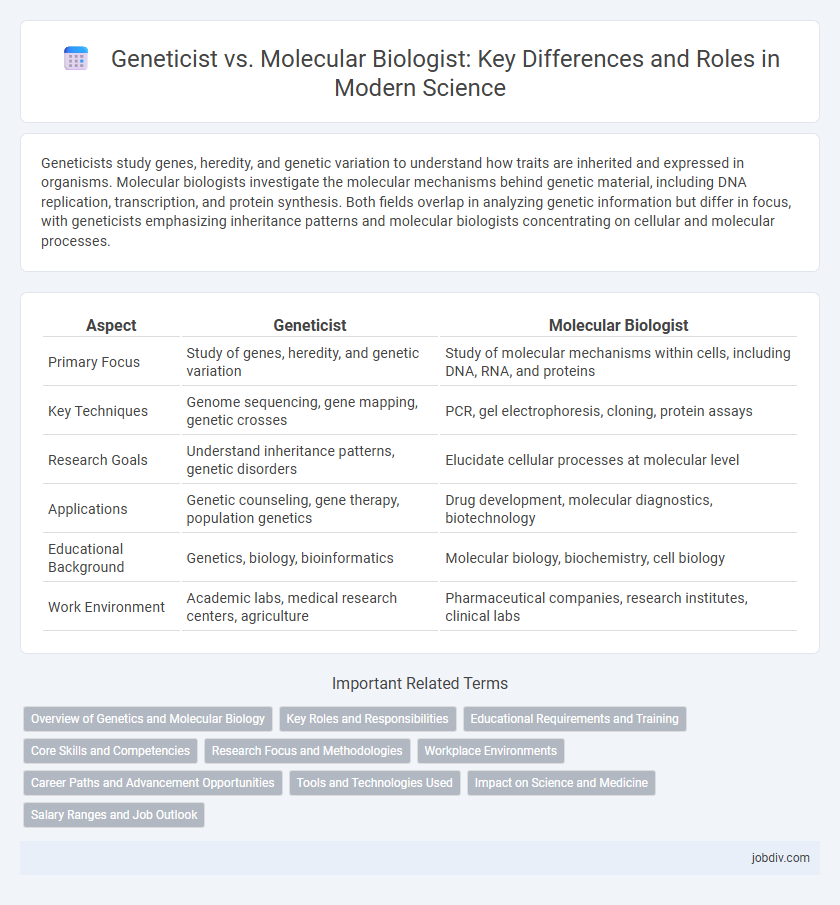Geneticists study genes, heredity, and genetic variation to understand how traits are inherited and expressed in organisms. Molecular biologists investigate the molecular mechanisms behind genetic material, including DNA replication, transcription, and protein synthesis. Both fields overlap in analyzing genetic information but differ in focus, with geneticists emphasizing inheritance patterns and molecular biologists concentrating on cellular and molecular processes.
Table of Comparison
| Aspect | Geneticist | Molecular Biologist |
|---|---|---|
| Primary Focus | Study of genes, heredity, and genetic variation | Study of molecular mechanisms within cells, including DNA, RNA, and proteins |
| Key Techniques | Genome sequencing, gene mapping, genetic crosses | PCR, gel electrophoresis, cloning, protein assays |
| Research Goals | Understand inheritance patterns, genetic disorders | Elucidate cellular processes at molecular level |
| Applications | Genetic counseling, gene therapy, population genetics | Drug development, molecular diagnostics, biotechnology |
| Educational Background | Genetics, biology, bioinformatics | Molecular biology, biochemistry, cell biology |
| Work Environment | Academic labs, medical research centers, agriculture | Pharmaceutical companies, research institutes, clinical labs |
Overview of Genetics and Molecular Biology
Genetics explores heredity and gene function, emphasizing the transmission of genetic information through DNA sequences and allelic variations. Molecular biology investigates cellular mechanisms at the molecular level, including DNA replication, transcription, and protein synthesis, to understand gene expression regulation. Both fields intersect in analyzing genetic code and molecular interactions, yet genetics primarily studies inheritance patterns while molecular biology focuses on biochemical processes within cells.
Key Roles and Responsibilities
Geneticists analyze genes, heredity, and variations in organisms to understand genetic disorders and inheritance patterns, often conducting gene mapping and mutation studies. Molecular biologists focus on the molecular mechanisms of biological processes, including DNA replication, transcription, and protein synthesis, using techniques like PCR and gel electrophoresis. Both scientists contribute to advancements in genomics and biotechnology, but geneticists emphasize genetic traits and diseases, while molecular biologists investigate cellular function at the molecular level.
Educational Requirements and Training
Geneticists typically require a Ph.D. in genetics or a related field, involving extensive training in heredity, gene function, and genetic variation through advanced coursework and research projects. Molecular biologists often pursue a Ph.D. or master's degree in molecular biology or biochemistry, emphasizing hands-on laboratory skills in DNA/RNA analysis, protein interactions, and cell molecular mechanisms. Both professions demand rigorous training in experimental design, data analysis, and laboratory techniques, but geneticists focus more on genetic inheritance patterns, while molecular biologists concentrate on cellular and molecular processes.
Core Skills and Competencies
Geneticists specialize in analyzing heredity and gene function, requiring strong expertise in DNA sequencing, genetic mapping, and bioinformatics tools. Molecular biologists focus on understanding molecular mechanisms of cellular processes, excelling in techniques like PCR, protein purification, and microscopy. Both fields demand proficiency in experimental design, data analysis, and laboratory techniques, with geneticists emphasizing genetic variation study and molecular biologists concentrating on cellular and protein interactions.
Research Focus and Methodologies
Geneticists primarily investigate gene structure, function, and inheritance patterns using techniques such as genome sequencing, linkage analysis, and gene editing tools like CRISPR-Cas9. Molecular biologists focus on molecular mechanisms within cells, including DNA replication, transcription, and protein synthesis, employing methodologies such as PCR, gel electrophoresis, and molecular cloning. Both disciplines integrate bioinformatics and microscopy to analyze genetic material, yet geneticists emphasize heredity and variation, while molecular biologists explore cellular molecular processes.
Workplace Environments
Geneticists primarily work in research laboratories, universities, and biotechnology firms where they analyze genetic material to understand heredity and genetic disorders. Molecular biologists are often found in similar environments but also frequently engage in pharmaceutical companies and clinical settings to study molecular mechanisms underlying diseases. Both professions require access to advanced laboratory equipment, but molecular biologists may have more direct involvement with experimental applications in medicine and drug development.
Career Paths and Advancement Opportunities
Geneticists primarily focus on studying genes, heredity, and genetic variation, often working in research institutions, healthcare, or agricultural industries, with career advancement typically leading to senior research roles or academic positions. Molecular biologists investigate the molecular mechanisms within cells, including DNA, RNA, and protein interactions, and their career trajectory often includes opportunities in pharmaceuticals, biotechnology, and clinical labs with roles progressing to project management or specialized scientific leadership. Both careers require advanced degrees, with progression relying on skills development, publication records, and contributions to groundbreaking research.
Tools and Technologies Used
Geneticists primarily utilize tools such as gene sequencing technologies, PCR (polymerase chain reaction), and CRISPR for gene editing and analysis of hereditary information. Molecular biologists rely extensively on techniques like gel electrophoresis, western blotting, and fluorescence microscopy to study cellular processes at the molecular level. Both disciplines employ advanced bioinformatics software to analyze large-scale genomic and proteomic data, enhancing the understanding of gene function and molecular mechanisms.
Impact on Science and Medicine
Geneticists advance science and medicine by uncovering genetic variations that underpin hereditary diseases, enabling targeted therapies and personalized medicine. Molecular biologists decode cellular processes at the molecular level, facilitating the development of drugs and diagnostic tools that address disease mechanisms. Together, these disciplines drive innovations in gene therapy, cancer treatment, and biotechnology applications, significantly impacting healthcare and biomedical research.
Salary Ranges and Job Outlook
Geneticists typically earn between $60,000 and $120,000 annually, with median salaries around $85,000, while molecular biologists have salary ranges from $55,000 to $110,000, averaging near $75,000 per year. Job outlook for geneticists is projected to grow by 10% over the next decade, driven by advances in gene therapy and personalized medicine, whereas molecular biologists face an 8% growth rate, fueled by research in molecular diagnostics and biotechnology. Both fields offer robust career prospects with increasing demand in academic, clinical, and pharmaceutical sectors.
Geneticist vs Molecular Biologist Infographic

 jobdiv.com
jobdiv.com